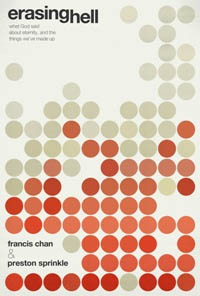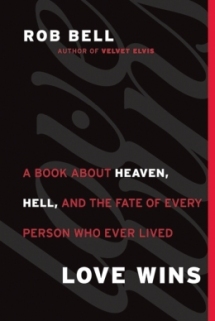
The early words of Francis Chan are an excellent preface to what you will find in "Erasing Hell", a new book that resoundingly challenges the premise and conclusions of universalism, especially as highlighted recently in Rob Bell's "Love Wins".
So I decided to write a book about hell. And honestly—I’m scared to death. I’m scared because so much is at stake. Think about it. If I say there is no hell, and it turns out that there is a hell, I may lead people into the very place I convinced them did not exist! If I say there is a hell, and I’m wrong, I may persuade people to spend their lives frantically warning loved ones about a terrifying place that isn’t real! When it comes to hell, we can’t afford to be wrong. This is not one of those doctrines where you can toss in your two cents, shrug your shoulders, and move on. Too much is at stake. Too many people are at stake. And the Bible has too much to say.[1]
Chan takes the high ground in this well researched book- he refuses to label or harangue Bell, and in fact compliments him on the admirable aspects of several of his points. Francis Chan is careful to deal directly with the material on the issue of hell, salvation and our purpose on earth. What is helpful about the book, is that he provides solid exploration of all the Biblical texts dealing with the pertinent issues- including ones that look (at first) to support an opposing view. This is precisely what Rob Bell failed to do in "Love Wins", and "Erasing Hell" is clearly written to correct and critique on both content and method.
I won't go into the details of each point made by Chan, but one point that is of major importance is his refutation of Bell's false interpretation of hell, which shows the disparity between Bell's unresearched work and Chan's book. Chan says plainly:
Much of what Bell says about hell relies upon a legend from the Middle Ages.[2]
This is backed up by the appropriate details and further context. Additionally, Chan helps explore the actual scripture understandings, especially from Jesus and his followers that speak about hell (Chapter 3) and our understanding and responses to it (Chapter 5). Again, he faces several passages that are normally used by universalists as support and mines through the various interpretations and understandings of them.
Beyond the core of refutation of universalism (and Bell's book), Chan also provides a helpful FAQ (frequently asked questions) section in the Appendix which handles 6 common questions about hell. This material is very helpful and should be read by all pastors, as it is excellent summary to issues that have been discussion for centuries.
Chan's "Erasing Hell" is not a monolithic or even deeply impressive work, but it is a contrite and succinct response to Rob Bell's "Love Wins". It sets out to be a clear corrective on postmodern Christian universalism, and succeeds by taking classical and appropriate steps to expose the error and excise it as a sickness from the body of Christ - the American church.
Even if you haven't read "Love Wins", this book ("Erasing Hell") provides the outline for understanding these important issues.
Amazon Product Link: http://amzn.to/rvlG3C
Review by Kim Gentes
[1]Chan, Francis. “Erasing Hell”. (Colorado Springs, CO: David C Cook, 2011), Kindle Edition. Pg. 14
[2]Ibid., Pg 61
 Kim Gentes |
Kim Gentes |  5 Comments |
5 Comments |  apologetics,
apologetics,  chan,
chan,  erasing hell,
erasing hell,  francis chan,
francis chan,  hell,
hell,  love wins,
love wins,  rob bell,
rob bell,  universalism in
universalism in  Apologetics,
Apologetics,  Bible,
Bible,  Book Review,
Book Review,  Church,
Church,  Grief,
Grief,  Jesus,
Jesus,  Leadership,
Leadership,  Loss,
Loss,  Postmodern,
Postmodern,  Theology
Theology 
